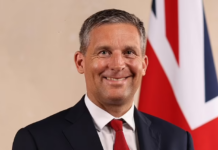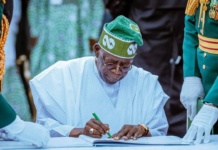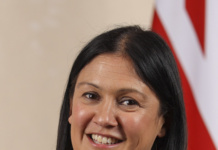Verbal missiles undermine Sierra Leone’s peaceful poll
Over two million people turned out to vote last Saturday (November 17) in Sierra Leone’s third election since the declaration of peace, after a long and brutal civil war that took the lives of over 50,000 civilians and left hundreds of thousands with mental and physical scars.
The peace-building process has been costly, long and tortuous, with the international community investing hundreds of millions of dollars. The democratisation of Sierra Leone has played a key role in empowering communities and consolidating the peace.
Will the outcome of last Saturday’s elections, continue to cement the peace in Sierra Leone or will the country remain as divided as it was prior to the war?
Elections held in 2007 saw the present government led by Ernest Koroma awarded victory, despite accusations that the National Electoral Commission (NEC) itself engaged in the serious and unlawful act of nullifying the ballots at 477 polling stations in the heartlands of the country’s main opposition SLPP. Perhaps tellingly, the NEC also went on to destroy all ballot papers cast at the 2007 elections, despite the fact that they are classed as official records, which, according to law, should have been kept for at least ten years. This prompted suspicions that the NEC had deliberately destroyed evidence that might have assisted in a possible call for a re-count by the opposition.
Five years on, the very same chairperson sits at the head of the NEC. Christiana Thorpe, who received a massive pay rise from President Koroma a few months ago, is now being accused of presiding over massive vote-rigging and other electoral irregularities across the capital Freetown, Kono and northern districts – the president’s power-base. Provisional results published so far by the country’s media, suggest a huge landslide for the government this time around. But the main opposition SLPP are already calling for an investigation.
In 2007, the outgoing president Tejan Kabbah, was accused by many of imposing his will on the SLPP leadership to accept the outcome of that year’s election, despite allegations of serious electoral malpractice. Today tells a rather different story. Senior officials of the opposition SLPP party say that they will not accept the results, given the level of vote rigging and other irregularities that were witnessed and have been partly confirmed by the NEC itself.
With over 90% of all votes cast now published, the provisional results are looking quite ominous for the SLPP. The party’s presidential candidate – Brig Gen (Rtd) Julius Maada Bio, who was widely expected to win the election, said the following in a statement on November 18:
“ . . . Madam Christian (sic) Thorpe in her latest statement to the Press, admitted the disruption of polling in some parts of the Western Area.
“She mentioned only three wards in Freetown, namely wards 362,292 and 394. Her statement also mentioned the disruption of polling due to election malpractices.
“In addition to the discrepancies identified by the NEC Chair and the National Elections Watch (NEW), it has come to the attention of the Party that the factors that have affected the polling in Freetown are more widespread and a lot more serious than has been reported by the NEC.
“We have ample evidence and vital information to substantiate a number of incidents bothering on irregularities that violate the Electoral Code and which has the potential to affect the final outcome of these elections.
“There is evidence of blatant ballot stuffing in several centres, especially in the Northern Region, Kono and Freetown with full complicity of NEC staff in most of these cases. At the time of counting the ballots, security officers at the polling station drove (away) our agents and prevented them from observing the process and collating results.
NEC Chair Dr. Christiana Thorpe, responded to criticism from several quarters, saying the Sierra Leone Peoples Party (SLPP) and the Peoples Movement Democratic Change (PMDC) should bring forth any evidence of malpractice by NEC officials.
Dr. Thorpe made the following comment while addressing the public at the NEC Headquarters at Tower Hill, in a national broadcast to Sierra Leoneans who are eager to hear the election results:
“The Commission received concerns from both the Peoples Movement for Democratic Change (PMDC) and the Sierra Leone Peoples Party (SLPP) on the conduct of elections and performance of NEC staff and the armed forces on polling day.”
In Bombali, Dr. Thorpe says NEC is aware that a voter register for one centre was lost only to be later found in another centre within the same ward. She said in Koinadugu, the election procedure allowed for a temporary register in the absence of the original one on polling day so long as voters had their ID .
“This was what occurred in Koinadugu and in any other area where it was found necessary to do so,” she says.
Dr. Thorpe announced that 99 percent of the votes have been received from all the tally centres and that 8,544 results have been processed. Of the votes 90 percent were valid while the rest of some 260,000 votes were in quarantine.
Commenting on the issue raised of unsigned or unstamped RRFs, Dr. Thorpe says NEC observed this lapse and that there are investigations where it occurred.
“It is important to understand that all who voted must have their votes counted and no one should feel disenfranchised,” she says.
The Commissioner did not take any questions. At the end of the press conference many were disappointed. The public has waited for days to hear results of the November 17th elections. When news broke that NEC was going to speak earlier on in the day everyone assumed that some results would be released.
Sierra Leoneans will not have peace of mind until NEC finally announces the nation’s next president. According to the law, the commission has up to 10 days to release the results. They have five more days.
A total of 112 parliamentary seats and 456 local council wards are up for grabs.
But the most precious ballot is that of the presidency, which requires a 55% majority to avoid another round of voting slated for no later than 8 December 2012. Both the ruling APC party and the main opposition SLPP, are confident of winning the concluded first round of polling. But the prognosis for a satisfactory result does not look too good.
The international election observers and local election watch organisations will need to intervene to ensure an independent and credible investigation into all allegations of malpractice is quickly and thoroughly implemented. Sierra Leone cannot afford a breakdown in law and order, nor does it need to see the return of political violence and chaos, which could seriously destabilise the country and unravel the economic and social progress that have been achieved since the end of the war in 2001.








